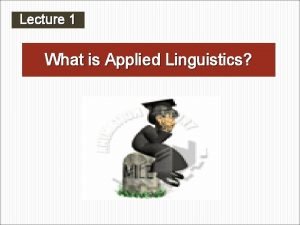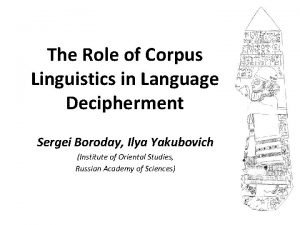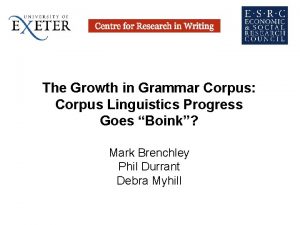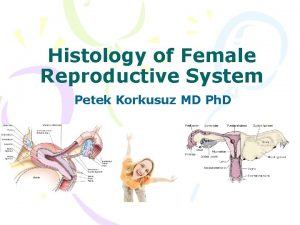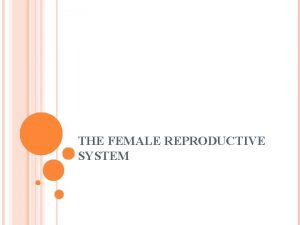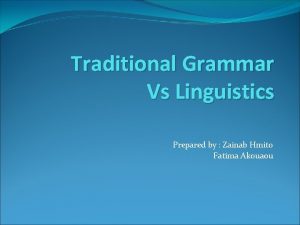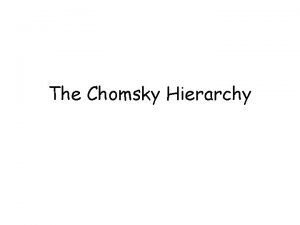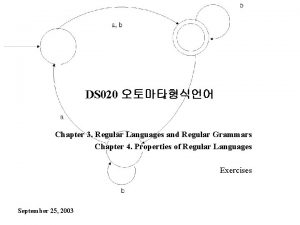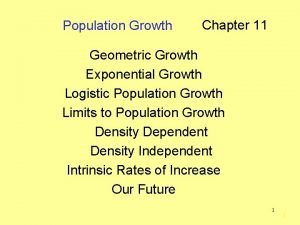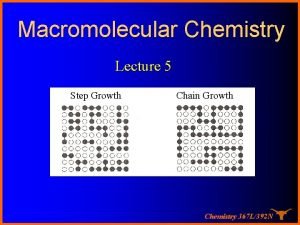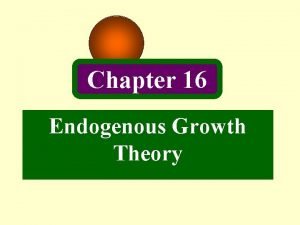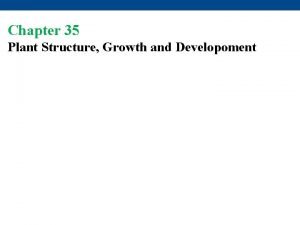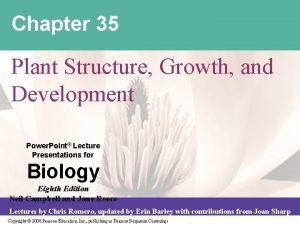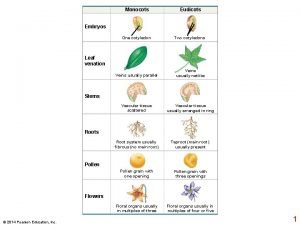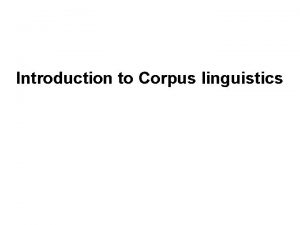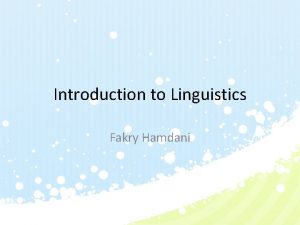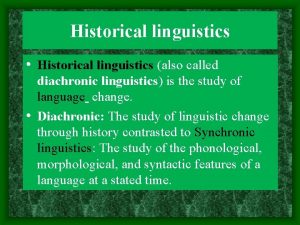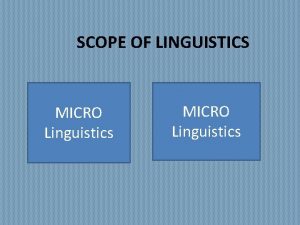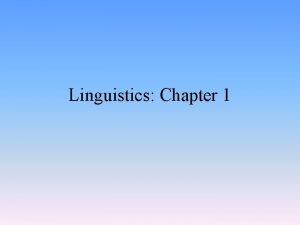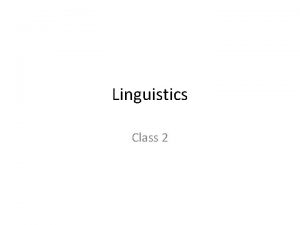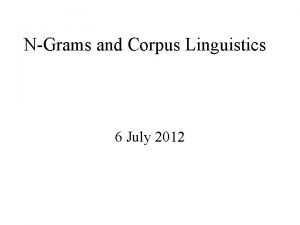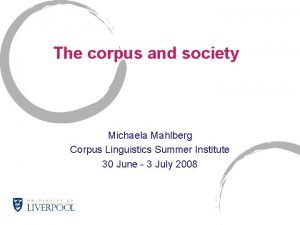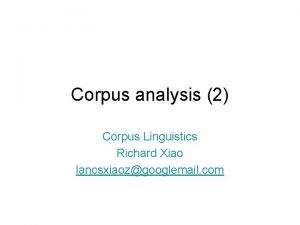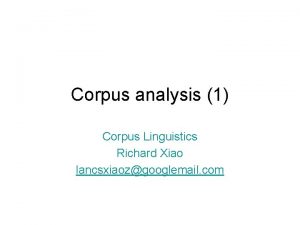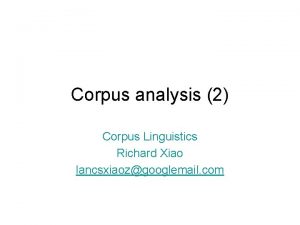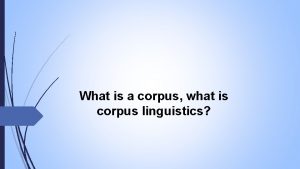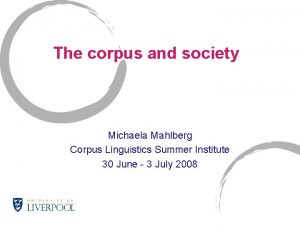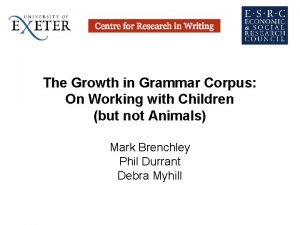The Growth in Grammar Corpus Corpus Linguistics Progress

























- Slides: 25

The Growth in Grammar Corpus: Corpus Linguistics Progress Goes “Boink”? Mark Brenchley Phil Durrant Debra Myhill


Growth in Grammar (Gi. G) Project Current Issues 1) Principled, reliable transcriptions of children’s writing 2) Understanding attainment ratings 3) Accurate, reliable identification of linguistic features

The Problem § MD analyses require target feature list to be as inclusive as possible (Conrad & Biber, 2001) § Original MD analysis = 67 features, 16 categories (Biber, 1988) § Gi. G project in process of determining target features § How many can we accurately and reliably measure? § If we can’t get them all, what is effect on final analysis?

Analytical Context 1) Reliant on automated annotation § 6, 000 texts (current aim: 4400) § Handwritten texts: bulk of construction effort going to (a) transcription + (b) feature counting 2) Reliant on publically available tagger § Resource contraints § Our choice: Stanford 3) No “gold standard” § Corpora generally L 1 adult or L 1 pre-school or developmental

General Issues I Higher Level Features § Many potential target features are “higher” level § Problem with Biber-type counting (Biber, 1988) e. g. AGENTIVE PASSIVES = “BE” + (ADV) + VBN + “by” CAUSATIVE SUBORDINATOR = “because” CONDITIONAL SUBORDINATOR = “if” § parsers < taggers re: accuracy and reliability

General Issues I “Displaced” Adj. Ps § The beast, monstrous, ravenous, roamed the house. appos(beast, monstrous) appos(monstrous, ravenous) § Monstrous, ravenous, the beast nsubj(roamed, monstrous) roamed the house. appos(monstrous, ravenous) appos(ravenous, beast) § The beast roamed the house, monstrous, ravenous. nsubj(ravenous, house) appos(house, monstrous)

General Issues I “Displaced” Adj. Ps § John chuckled, highly amused. xcomp(chuckled, amused) § He’s a great student, acl(student, dedicated) dedicated, hard-working and ambitious. xcomp(dedicated, hardworking) conj(hardworking, ambitious) § He is a terrible student, amod(stupid, nasty) nasty, amod(stupid, lazy) lazy, stupid. amod(student, stupid)

General Issues II Register Variation § Wide variety of discourse types e. g. “English” vs. “Science”; “Narrative” vs. “Exposition”; “Fictional Narrative” vs. “Non-Fictional Narrative” § Stanford parser trained on a highly specific register, the Wall Street Journal

General Issues II Register Variation § “As much mud in the streets as if the waters had but newly retired from the face of the earth, and it would not be wonderful to meet a Megalosaurus, forty feet long or so, waddling like an elephantine lizard up Holborn Hill. ”

General Issues II Register Variation § “As much mud in the streets as if the waters had but newly retired from the face of the earth, and it would not be wonderful to meet a Megalosaurus, forty feet long or so, waddling like an elephantine lizard up Holborn Hill. ” ✗ ROOT = lizard ✗ NSUBJ(retired, mud) ✗ DOBJ(lizard, Hill)✗ ADVCL(lizard, retired) ✗ *? (Megalaurus, waddling) § “lizard” = VBD [? ]

General Issues II Register Variation – Isolated NPs (Science) § folded secondary feathers root(folded-VBN) dobj(folded, feathers) § twitching ears root(twitching-VBG) dobj(twitching, ears) § lower beak root(lower-JJR) dep(lower, beak)

General Issues II Register Variation – Isolated NPs (English/History) § Clouds of dust as blinding as fog clouds) and the sound of animal roars dancing around the arena. dancing) § The sound of the gladiators, nsubj(declaring, sound) declaring war on each other. nsubj(roars, root(roars) xcomp(roars, root(declaring) root(sound) acl(gladiators, declaring)

Specific Gi. G Issues § Children’s discourse ≠ Wall Street Journal § Children’s discourse ≠ Adult discourse!

Specific Gi. G Issues

Specific Gi. G Issues Gi. G Texts § Not published/professionally edited § Not typed (mostly) § Often grammatically “incorrect” § Often grammatically “awkward” § Often diatypically underdeveloped § Wide variation in quality

Specific Gi. G Issues § Wide variation in quality is what we want (along with variation in kind) § But creates certain issues

Specific Gi. G Issues Grammatical “Errors” § “I feel the opportunities the Divert Trust are life changing and should be taken into consideration. ” ACL: REL(opportunities, life)

Specific Gi. G Issues Sentential Punctuation § I lost. But she won. I lost, but she won. I lost but she won. ROOT; ROOT conj(lost, won) ccomp(lost, won)

Specific Gi. G Issues Sentential Punctuation § Initial piloting suggests a definite, but irregular, impact § This isn't coming from taxpayers' money either, it is entirely fundraised. ccomp(fund-raised, coming)

Conclusion § Maybe not all that much of a surprise – issues are pretty much what you’d expect when working with a variable, even “deviant”, corpus § Besides, we do have some workarounds to at least partially address these issues § And even if we can’t fully address them maybe that’s not a major problem § Perhaps too sparse to substantively affect the final analysis § BUT

Conclusion § Not something we yet know, so it may well be that they are pervasive across the corpus considered as a single register. § And even if they aren’t pervasive across the corpus generally, they might be pervasive for certain kinds of texts within the corpus • Science reports • High level science reports § In which case, we lose our capacity to pick up on some core developmental differences, perhaps even the core differences, which is obviously not ideal if our MD-analysis is to do its job effectively § Or, to put it another way…

§ To what extent is it genuinely possible to systematically and comprehensively analyse the developmentally significant linguistics features of a automatically-parsed corpus of children’s writing without going boink?

http: //socialsciences. exeter. ac. uk/education/research/centre s/centreforresearchinwriting/projects/growthingrammar/

References § Biber, D. (1988). Variation across speech and writing. Cambridge: Cambridge University Press. § Conrad, S. & Biber, D. (2001). Multi-dimensional methodology and the Conrad & S. dimensions English. In register variation in of Variation in English: Multi- dimensional studies (pp. 13 -42). Harlow: Pearson.
 Physical progress and financial progress
Physical progress and financial progress Language
Language Theoretical linguistics vs applied linguistics
Theoretical linguistics vs applied linguistics Corpus linguistics
Corpus linguistics Corpus linguistics
Corpus linguistics Maxims of annotation in corpus linguistics
Maxims of annotation in corpus linguistics Corpus of
Corpus of Primary follicle function
Primary follicle function Lutalphase
Lutalphase Linguistics vs traditional grammar
Linguistics vs traditional grammar Formal linguistics definition
Formal linguistics definition Left-linear grammar
Left-linear grammar Unrestricted grammar is also known as
Unrestricted grammar is also known as Right linear grammar to left linear grammar
Right linear grammar to left linear grammar Geometric growth vs exponential growth
Geometric growth vs exponential growth Step growth polymerization vs chain growth
Step growth polymerization vs chain growth Neoclassical growth theory vs. endogenous growth theory
Neoclassical growth theory vs. endogenous growth theory Primary growth and secondary growth in plants
Primary growth and secondary growth in plants Difference between organic and inorganic growth
Difference between organic and inorganic growth Primary growth and secondary growth in plants
Primary growth and secondary growth in plants Root hair structure
Root hair structure What is growth analysis
What is growth analysis Thiếu nhi thế giới liên hoan
Thiếu nhi thế giới liên hoan Sự nuôi và dạy con của hươu
Sự nuôi và dạy con của hươu điện thế nghỉ
điện thế nghỉ Một số thể thơ truyền thống
Một số thể thơ truyền thống


